|
|
|
Sort Order |
|
|
|
Items / Page
|
|
|
|
|
|
|
| Srl | Item |
| 1 |
ID:
184199
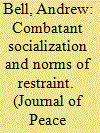

|
|
|
|
|
| Summary/Abstract |
Can armed groups socialize combatants to norms of restraint – in essence, train soldiers to adopt norms of international humanitarian law on the battlefield? How can social scientists accurately measure such socialization? Despite being the central focus of organizational and ideational theories of conflict, studies to date have not engaged in systematic, survey-based examination of this central socialization mechanism theorized to influence military conduct.
This study advances scholarly understanding by providing the first comparative, survey-based examination of combatant socialization to norms of restraint, using surveys and interviews with US Army cadets at the US Military Academy (USMA), Army Reserve Officer Training Corps (ROTC), and active duty Army combatants. Additionally, to better understand ‘restraint’ from combatants’ perspective, this study introduces the concept of the ‘combatant’s trilemma’ under which combatants conceptualize civilian protection as part of a costly trade-off with the values of military advantage and force protection.
Survey results hold both positive and negative implications for socialization to law of war norms: military socialization can shift combatants’ preferences for battlefield conduct. However, intensive norm socialization may be required to shift combatants’ preferences from force protection to civilian protection norms. Study findings hold significant implications for understanding violence against civilians in conflict and for policies to disseminate civilian protection norms in armed groups worldwide.
|
|
|
|
|
|
|
|
|
|
|
|
|
|
|
|
| 2 |
ID:
120663
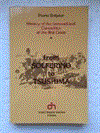

|
|
|
|
|
| Publication |
Geneva, Henry Dunant Institute, 1985.
|
| Description |
391p.Pbk
|
| Standard Number |
2880440122
|
|
|
|
|
|
|
|
|
|
|
|
Copies: C:1/I:0,R:0,Q:0
Circulation
| Accession# | Call# | Current Location | Status | Policy | Location |
| 057323 | 361.77/BOI 057323 | Main | On Shelf | General | |
|
|
|
|
| 3 |
ID:
120632
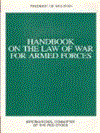

|
|
|
|
|
| Publication |
Geneva, International Committee Of the Red Cross, 1987.
|
| Description |
xxiv; 232p.,1-17p.,1-3p.Pbk
|
| Standard Number |
2881450091
|
|
|
|
|
|
|
|
|
|
|
|
Copies: C:1/I:0,R:0,Q:0
Circulation
| Accession# | Call# | Current Location | Status | Policy | Location |
| 057320 | 341.6/MUL 057320 | Main | On Shelf | General | |
|
|
|
|
| 4 |
ID:
120599
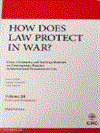

|
|
|
|
|
| Publication |
Geneva, International Committee Of the Red Cross, 2011.
|
| Description |
3vol.set; 508p.Hbk
|
| Contents |
Vol.1: Part I-Outline of International Humanitarian Law
|
| Standard Number |
9782940396122
|
|
|
|
|
|
|
|
|
|
|
|
Copies: C:1/I:0,R:1,Q:0
Circulation
| Accession# | Call# | Current Location | Status | Policy | Location |
| 057313 | 341.6/SAS 057313 | Main | On Shelf | Reference books | |
|
|
|
|
| 5 |
ID:
120600
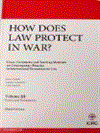

|
|
|
|
|
| Publication |
Geneva, International Committee Of the Red Cross, 2011.
|
| Description |
3vol.set; 511p.-1623p.Hbk
|
| Contents |
Vol 2: PartII-Cases and Documents
|
| Standard Number |
9782940396122
|
|
|
|
|
|
|
|
|
|
|
|
Copies: C:1/I:0,R:1,Q:0
Circulation
| Accession# | Call# | Current Location | Status | Policy | Location |
| 057314 | 341.6/SAS 057314 | Main | On Shelf | Reference books | |
|
|
|
|
| 6 |
ID:
120613
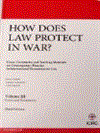

|
|
|
|
|
| Publication |
Geneva, International Committee Of the Red Cross, 2011.
|
| Description |
3 vol.set; 1627p.-2580p.Hbk
|
| Contents |
Vol 3: Part II- Cases and Documents
|
| Standard Number |
9782940396122
|
|
|
|
|
|
|
|
|
|
|
|
Copies: C:1/I:0,R:1,Q:0
Circulation
| Accession# | Call# | Current Location | Status | Policy | Location |
| 057315 | 341.6/SAS 057315 | Main | On Shelf | Reference books | |
|
|
|
|
| 7 |
ID:
074937
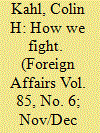

|
|
|
|
|
| Publication |
2006.
|
| Summary/Abstract |
Reports that U.S. troops may have killed 24 civilians in Haditha, Iraq, last November have renewed fears that the U.S. military routinely violates the laws of war. But is the Haditha incident the exception or the rule? In fact, U.S. compliance with noncombatant immunity in Iraq has been relatively high by historical standards, and it has been improving since the beginning of the war.
|
|
|
|
|
|
|
|
|
|
|
|
|
|
|
|
| 8 |
ID:
065288
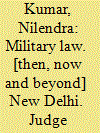

|
|
|
|
|
| Publication |
New Delhi, Judge Advocate General's Department, 2005.
|
| Description |
xiv, 285p.
|
|
|
|
|
|
|
|
|
|
|
|
Copies: C:2/I:0,R:0,Q:0
Circulation
| Accession# | Call# | Current Location | Status | Policy | Location |
| 049967 | 343.0150954/KUM 049967 | Main | On Shelf | General | |
| 049968 | 343.0150954/KUM 049968 | Main | On Shelf | General | |
|
|
|
|
| 9 |
ID:
187554
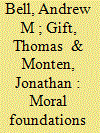

|
|
|
|
|
| Summary/Abstract |
How does partisan identification shape the attitudes of US military officers toward the protection of civilians in war? Drawing on unique cross-cohort surveys of soon-to-be commissioned officers in 12 Army Reserve Officers’ Training Corps (ROTC) training battalions, we find that Democratic-leaning cadets generally prioritize norms of civilian protection more than Republican-leaning cadets when confronted with competing values of military advantage and force protection as part of a ‘combatant’s trilemma’. This gap remains partially resilient after sustained exposure to military training and socialization, including in the norms of restraint embodied by principles of combat ethics and the law of war. We attribute these partisan differences to insights from Moral Foundations Theory (MFT), which suggests that the moral values of Democrats and Republicans guide their views toward the individual use of force in combat. Our findings have important implications for comprehending the impact of political ideology and military training and socialization on attitudes regarding restraint toward civilians in war. Given the widely recognized conservative composition of the US military’s membership, these findings may help to further inform understanding of US military operations and the underlying causes of US adherence to – or violation of – the laws of armed conflict.
|
|
|
|
|
|
|
|
|
|
|
|
|
|
|
|
| 10 |
ID:
187971
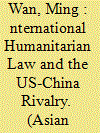

|
|
|
|
|
| Summary/Abstract |
The US government has shifted strategic focus from war on terror to great power contest with China and Russia. But there has not been corresponding thinking about the role of international humanitarian law (IHL) and the law of war (LOW) in the United States or China. Both IHL and human rights law (HRL) originated from Western legal traditions and advantage the United States and the West. China had to adapt and is now challenging the West-dominated international order, a major source of its tension with the United States. Both China and the United States invoked the Geneva Conventions against each other during the Korean War. The war took place seven decades ago, and much has changed since then. But it is the only precedent between the two great powers. LOW provides a structure for managing conflict between the great powers. In turn, a rivalry between the two greatest powers would make IHL narrowly based on national interests and weaken its linkage to human rights.
|
|
|
|
|
|
|
|
|
|
|
|
|
|
|
|
| 11 |
ID:
140174
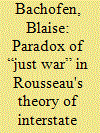

|
|
|
|
|
| Summary/Abstract |
In the Social Contract, Rousseau declares that he has given up the idea of discussing the “external relations” of states. Yet numerous texts—including a recently reconstituted work about the law of war—show that he thought very seriously about the question of the nature and origin of war and of the possibility of making war subject to the rule of law. Rousseau, in contrast to Hobbes, links war's appearance to that of the sovereign states; the state of war is therefore the necessary result of international relations. Moreover, he considers the international law as chimerical. How can he then conceive a non-utopian theory of “just war”? My hypothesis is that his conception of the law of war is deduced from principles of internal political law and arises from pragmatic necessity. The state that discredits itself in its manner of waging war weakens itself while believing that it is reinforcing itself.
|
|
|
|
|
|
|
|
|
|
|
|
|
|
|
|
| 12 |
ID:
062579
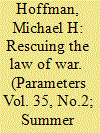

|
|
|
| 13 |
ID:
189449
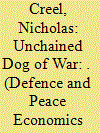

|
|
|
|
|
| Summary/Abstract |
Research on the constraint President’s face in matters of foreign policy is generally of the view that they are largely free to do as they please. Some research however posits that Congressional constrain on the executive is in fact much larger than it is given credit for. Using their research as a jumping off point, I re-examine this matter by asking when the President will seek ex ante Congressional authorization for the use of force. I estimate this potential effect of Congressional constraint on the President by looking at US initiated militarized interstate disputes with at least one fatality. In so doing, it is demonstrated that no Congressional constrain exists in this regard; the President rarely seeks ex ante authorization for the use of force and is therefore not truly constrained in its use. In fact, evidence is brought to bear that if anything the diversionary theory of war initiation may hold water; inflation is shown herein to be negatively linked to ex ante Congressional authorization for the use of force. It seems as though the President is less likely to ask Congress for permission to conduct deadly military operations when inflation is high.
|
|
|
|
|
|
|
|
|
|
|
|
|
|
|
|
| 14 |
ID:
146803
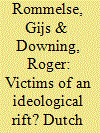

|
|
|
|
|
| Contents |
Dutch prisoners from the sea battles of the First Anglo-Dutch War of 1652–1654 were held in England under generally inhumane conditions. It has recently become accepted that ideological differences, as much as commercial, led to the deterioration in relations that led to the conflict. English public opinion had been inflamed by a vicious anti-Dutch propaganda campaign, suggesting that ideological demonization could provide the explanation for the dire treatment to which the prisoners were subjected. It is concluded, however, that logistical problems associated with their reception, plus the chronic lack of money of Cromwell’s regime, provide a sufficient explanation.
|
|
|
|
|
|
|
|
|
|
|
|
|
|
|
|
| 15 |
ID:
116239
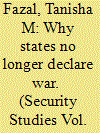

|
|
|
|
|
| Publication |
2012.
|
| Summary/Abstract |
Why have states stopped issuing declarations of war? Declaring war was a norm of international politics for millennia, but now appears to have exited states' behavioral repertoires. I argue that the proliferation of codified jus in bello, the law of war governing belligerent conduct, has created disincentives for states to issue formal declarations of war. The increasing number of codified international laws that govern belligerent conduct during warfare has made complying with the laws of war extremely costly. One way for states to limit these costs is to avoid admitting they are in a formal state of war by refraining from declaring war. I test this claim, as well as others, using an original data set. I also discuss several cases of nineteenth and twentieth century wars that illustrate the logic of this argument.
|
|
|
|
|
|
|
|
|
|
|
|
|
|
|
|
|
|
|
|
|